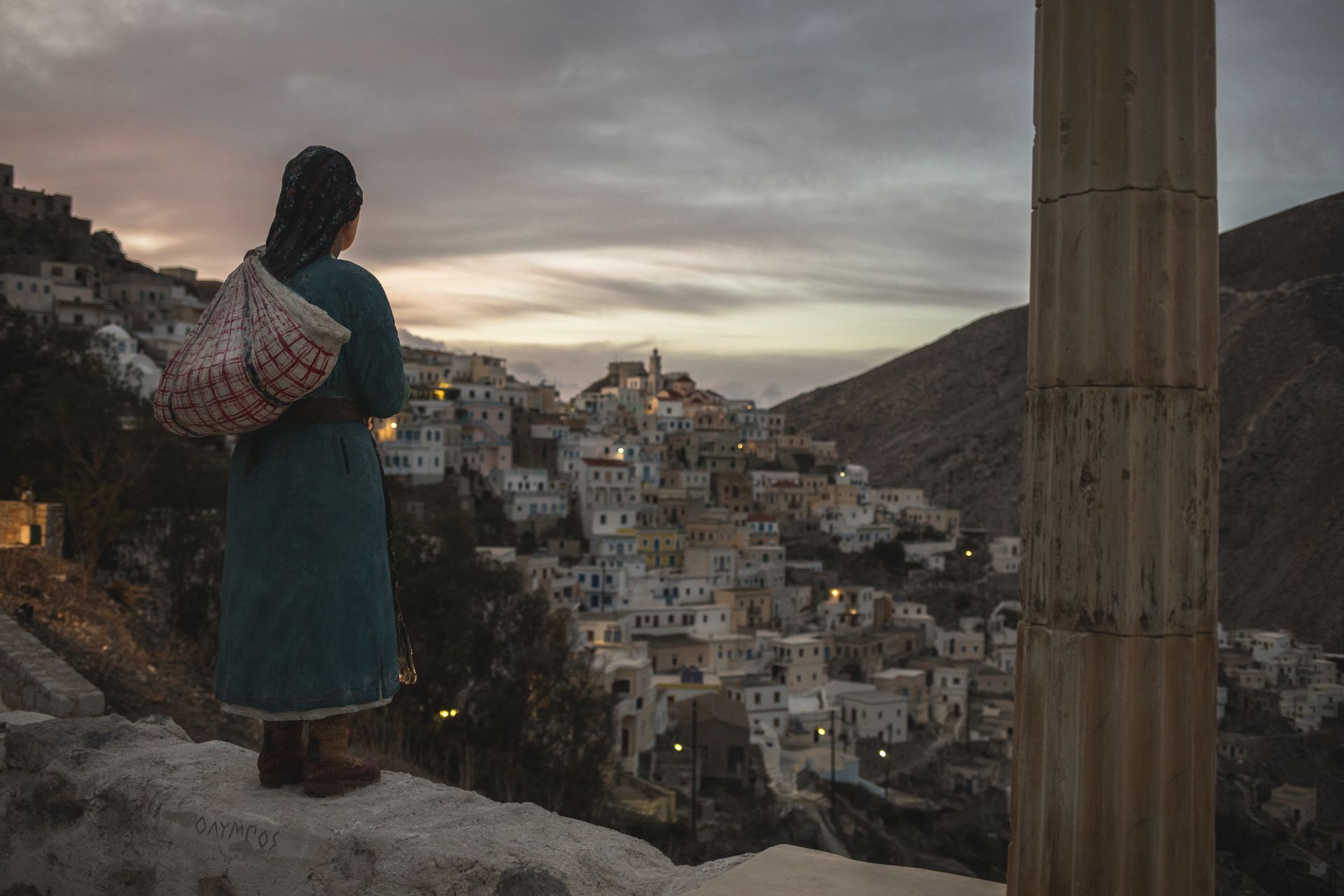In the rustic embrace of Avlona, nestled in the northern part of the Greek island of Karpathos in the Aegean Sea, Anna Lentaki, at the age of 70, tends to her plot of land with a blend of tradition and practicality. Her two long braids sway as she adjusts her black headscarf, after enjoying the last fruits of the season from the fig tree that graces her farmland. Anna has inherited both the property and land from her parents, and is the sole heir to her family’s fortune, as per local traditions, for this is the last vestige of a matriarchal way of life. As the eldest daughter of the family, it is Anna’s lifelong responsibility to oversee and care for her family’s wealth.
Beside her is Michalis, her husband, and together they form a snapshot of a bygone era. It’s as if they have stepped out of a 19th-century painting while diligently pruning grapevines, preparing for the cycles of growth that the coming year will bring. Anna and Michalis embody the quiet beauty of rural life. As they work in tandem, their presence is a living homage to the simplicity and resilience that define life in Avlona. But this way of life is fast disappearing, thanks to underdevelopment, dwindling resources and mass emigration.
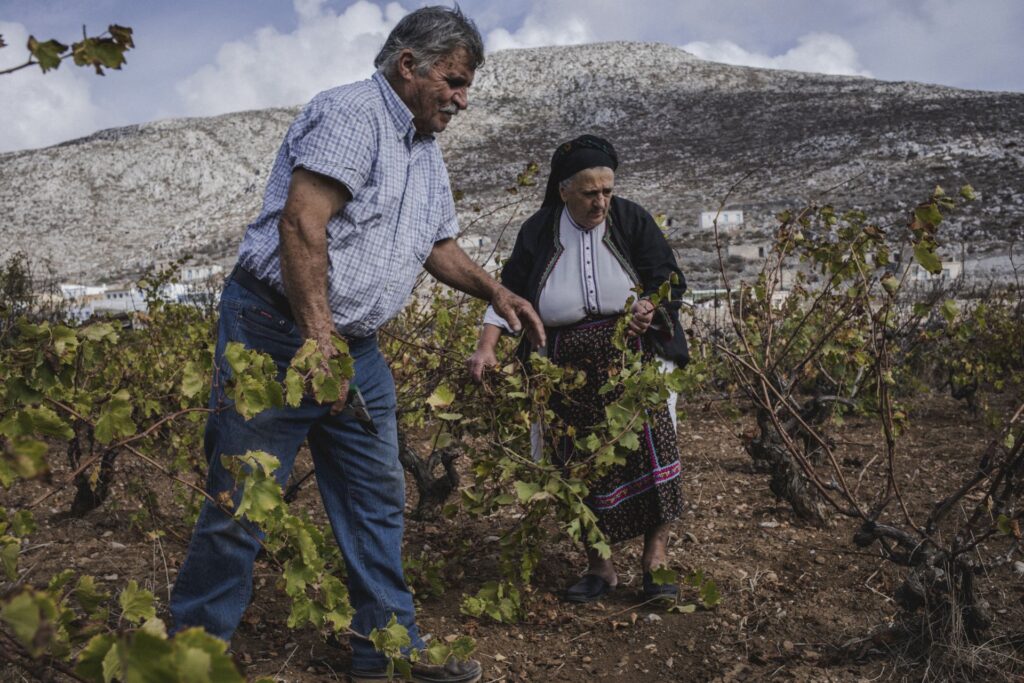
In this part of Karpathos, there are no fancy tourist resorts, micro-bakeries, beach bars or gourmet restaurants. Life seems to have frozen in time. There are just a couple of old-fashioned tavernas and barely any cellphone coverage. All the residents of Avlona are originally from a nearby mountain village, Olympos, and migrated here in the 1960s to cultivate wheat, fruit and olives as well as graze their animals. But what really sets Olympos’ community apart is that it stands as one of the last matriarchal societies in Europe.
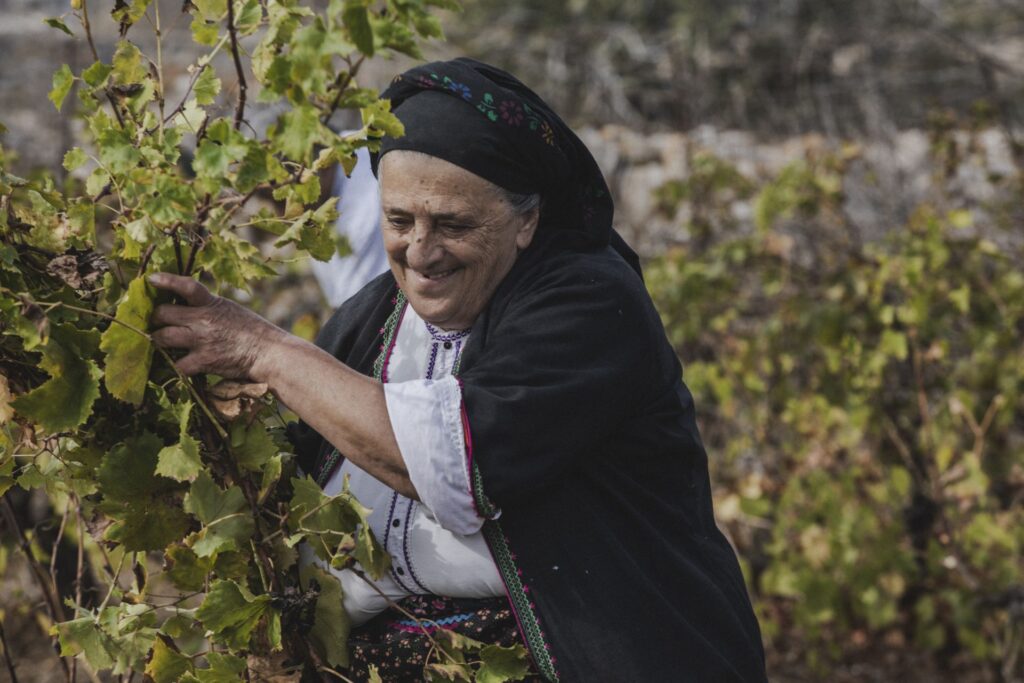
The residents of Olympos find it challenging to articulate the reasons behind the significant empowerment of women over the centuries, a phenomenon that sharply distinguishes them from the patriarchal nature of mainland Greece. Researchers and anthropologists unanimously acknowledge the heightened influence and autonomy of women, not only in Karpathos but in all islands in the Aegean Sea. Renee Hirschon, emerita fellow of St. Peter’s College, University of Oxford and author of the book “Women and Property, Women as Property,” emphasizes the lack of a comprehensive investigation into the subject. Nevertheless, she asserts that the influence of women in these islands is intricately linked to their traditional inheritance system, with its preferential treatment of women, which led to both economic and leadership roles in the family.
In the conventional Greek family, particularly in mainland Greece, it has long been customary for women to relocate to their husbands’ homes upon marriage, leaving behind their families’ households. This resulted in a situation where women frequently felt confined within a patriarchal structure, their own families sidelined. Hirschon notes that in these traditional Greek societies, the property was passed down to the children of the family, with the men often getting preferential shares. But “that does not apply in the Aegean islands at all,” she says categorically.
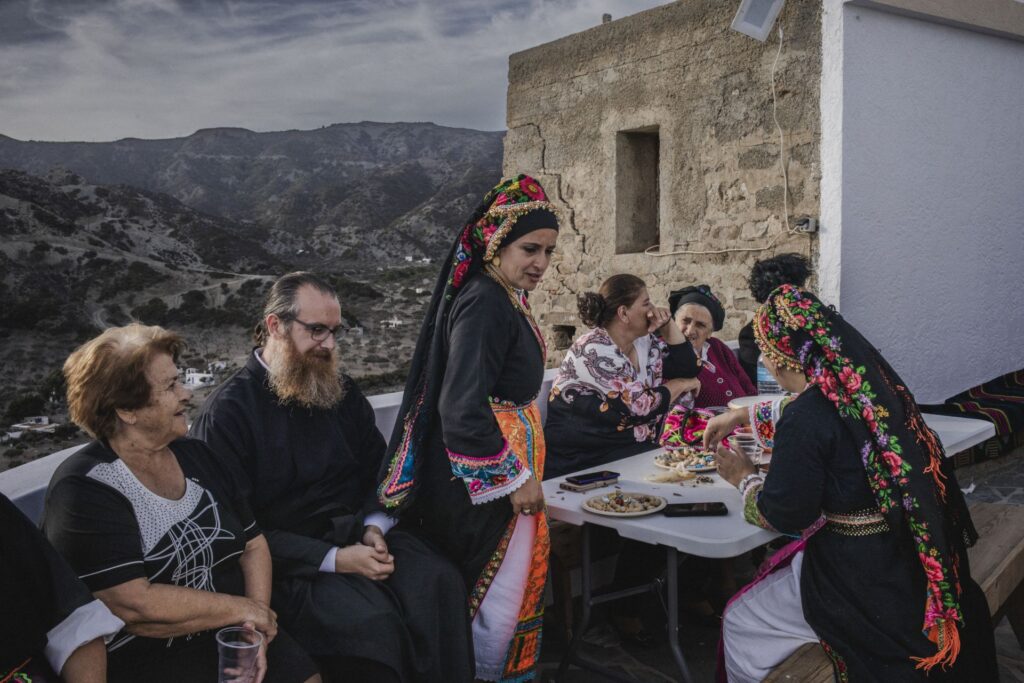
In many Aegean islands, the soil lacks fertility, making it challenging for families to rely solely on agriculture. Consequently, trade and shipping emerged as crucial avenues for income among the islanders. The commercial exchanges between Greece and other nations, coupled with a significant exodus of men from the Greek islands to work on ships, resulted in a notable shift in land inheritance dynamics. Typically, land ownership passed to women, as their permanent presence was seen as a safeguard for its integrity, and ownership of land served as a dowry.
Hirschon explains that in Karpathos, there were two separate lines of inheritance, one from the father and one from the mother. According to this system, the eldest daughter inherits her mother’s property in full, while the eldest son assumes the father’s property.
“If you live on an island the land is limited, so if the families would continue to divide their land it would end up having no value,” Hirschon says. “So I see this as a mechanism of preserving the integrity of the land to support at least one family.” However, the influence of women in Olympos extends beyond property rights, diverging markedly from the practices observed in the rest of Greece.
Olympos stands out as the sole community in Greece that has diligently preserved centuries-old traditions with origins tracing back to the Byzantine Empire. Within this distinctive hillside village, elements such as Byzantine-era music, dances and costumes not only persist but thrive. Having overcome historical challenges, including enduring the Ottoman Empire in the 16th century and Italian rule in the 20th, the community remains unwavering in its commitment to maintaining its unique way of life.
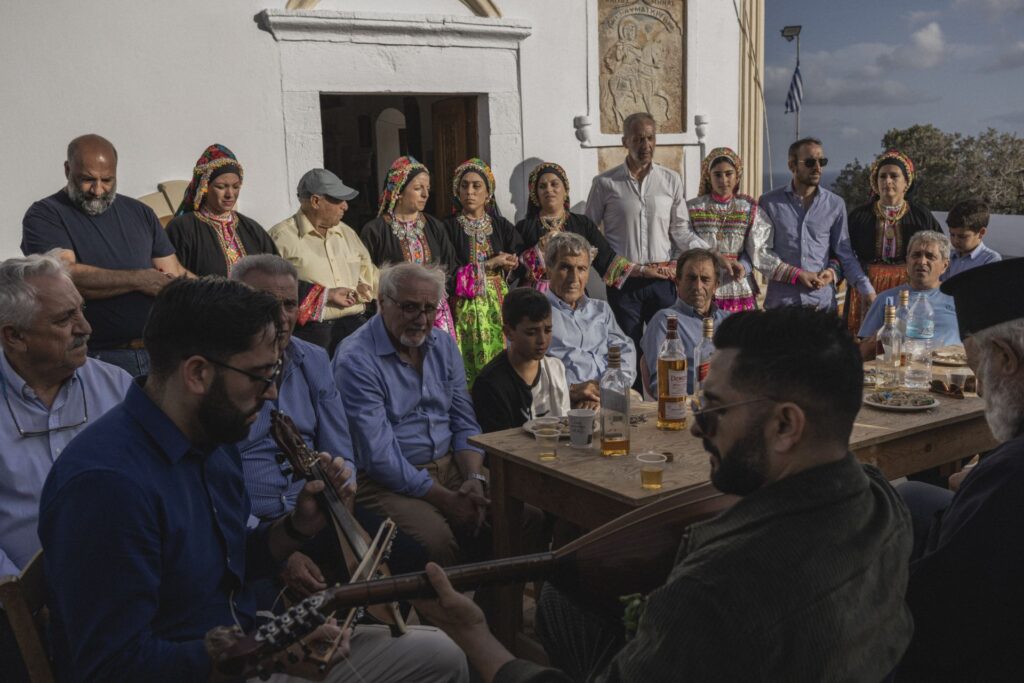
In matters of nomenclature, this matriarchal enclave also treads a distinctive path. The eldest daughter adopts the first name of her maternal grandmother, a departure from the prevalent Greek custom of using the name of the paternal grandmother. This nuanced preservation of heritage has made Olympos’ matriarchal legacy renowned.
However, the inheritance system, favoring firstborn children, has created economic disparities within families, resulting in a social structure divided into two classes: the firstborn, who amassed wealth and power, and those owning nothing. In the past, the economic divide had far-reaching consequences, particularly for the younger daughters who lacked the dowry traditionally required for marriage. Faced with limited options, they often remained unmarried and instead served as unpaid labor for their married firstborn sisters. The men who were left without any inheritance were compelled to migrate to other parts of the country like Athens, Crete, Rhodes and, eventually, in large numbers to America. The intricate interplay of tradition and necessity has shaped the complex social landscape of Olympos over generations. As more and more men left the island, a growing population of women were left behind to manage the village on their own.
Anna has already passed down all her property to her daughter, who also lives permanently in the village. “My legs can no longer bear the rigors of life in Olympos,” Anna shares, gently pulling up her long white skirt to reveal feet wearied from the toils of labor.
Like most of the women of her generation in Olympos, Anna is adorned in the age-old attire known as “kavai.” This traditional ensemble comprises a tunic, a black overcoat, an apron and a headscarf, a design that transcends time, encapsulating the essence of Olympos’ cultural identity. For many elderly women in Olympos, the kavai isn’t merely an outfit; it’s a solid symbol of their heritage that they carry throughout their lives. Most of these women have worn nothing else but their kavai throughout the years, embracing the continuity of their customs with a sense of pride and commitment.
“When I wear my (traditional) outfit I feel very proud of myself. I feel a responsibility to honor it,” Anna says.
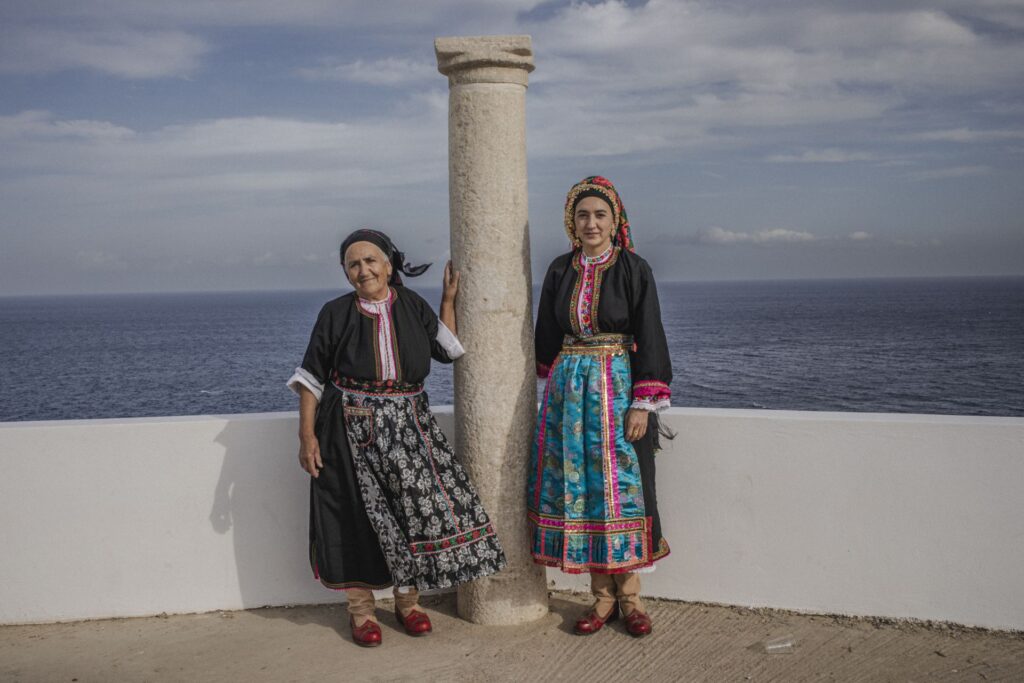
The women of Olympos have themselves become a symbol for the island. Upon entering the village, visitors are greeted by a sculpture depicting an Olymbiti woman, her gaze fixed upon the village with the pastel-colored houses and the stone windmills she calls home. This encapsulates the enduring strength of the women in Olympos who, over the years, have been the backbone of both the village and their households.
The sculpture not only pays homage to the resilience and leadership of Olympos’ women but also serves as a poignant commentary on the challenges faced by the community. According to the artists Yiannis Hatzivasilis and his brothers Manolis and Antonis, who wrote a few words in an inscription plaque, the woman’s gaze reflects not only her commitment to the village but also the harsh reality of abandonment, as most of Olympos’ residents have moved to other parts of the country or even abroad. In this visual narrative, the sculpture becomes a silent storyteller, weaving together the threads of strength, determination and the harsh reality of life in Olympos.
Isolated from the rest of the island until the 1980s, Olympos lacked basic amenities like electricity, running water and a paved road connecting it to the main city, another reason that many sought opportunities elsewhere. Starting in the 1960s, a significant wave of Olymbites migrated, with a considerable number choosing the United States, particularly Baltimore, as their destination. Anna is one Olymbiti who ventured to the U.S., where she spent four years working in a factory, earning a good income.
Reflecting on her time abroad, Anna says, “I liked it there, but my heart was always here in Olympos. I had to come back because I was the firstborn daughter of my family, so it was my responsibility to take care of my parents and their property. So, I packed my things and returned.” This example is not the norm; it was usually men going to the U.S. for work while leaving their families behind. Women thus found themselves shouldering the responsibilities of raising children, tending to animals, and managing the fields in the absence of their husbands. Marina Lentaki, 42, the firstborn daughter of Anna and Michalis, carries the same responsibility. “I wanted to study, but I wasn’t able. As a firstborn daughter and the one who inherited the property of my mother, I had to take care of the property and my younger siblings.” While taking a break from cooking in the restaurant passed down from her mother, with a panoramic view of the village as her backdrop, she tells me: “I wanted them to study so they would have a better life.”
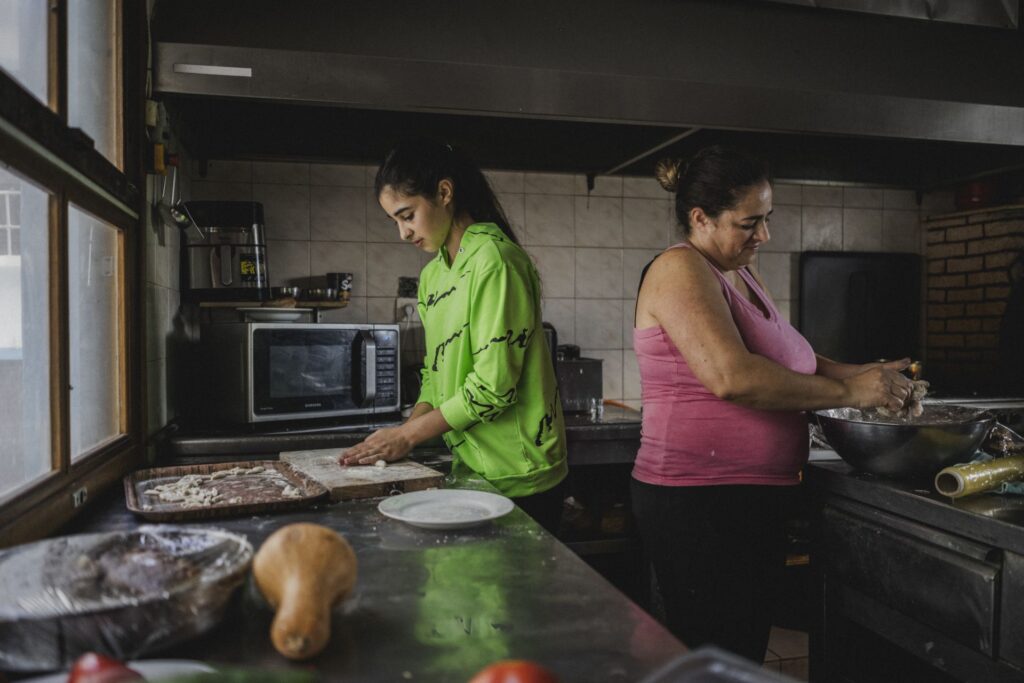
Life in Olympos remains remarkably challenging, with the village currently home to only 60 to 65 permanent residents, a stark contrast to the 1,200 inhabitants in 1947. Marina humorously notes that there are now more cats than people in the village. The exodus of families with young children has further depleted the population, with many returning only during the summer months. Come winter, the village faces near-desertion.
Despite these challenges, Marina expresses a deep attachment to the village where she was born and raised. “I love it here. I cannot find this peace anywhere else.”
Until three years ago, Karpathos lacked a hospital, meaning residents had to travel to nearby islands like Crete and Rhodes, or even Athens, for medical care. Marina shares her own experiences, saying, “I was pregnant twice. Both times, a week before I was expected to give birth, I went to Rhodes, gave birth, and came back.” With the assistance of partial funding from the European Commission, a new hospital has now been built, marking a significant milestone for Karpathos. Now, the focus shifts to the next challenge on the horizon: the school.
Marina’s children are two of the nine remaining children of Olympos. To provide them with English classes and private coaching, she frequently makes the hourlong drive through the winding mountain roads to Pigadia, the main city of Karpathos. “I spend a lot of money every time I take my children to Pigadia. But I know that if I move out of Olympos and the school loses two students, it will close down permanently,” she says with disappointment evident on her face.
Between the 1960s and the 2000s, mass urbanization led to a dramatic decrease of population on most Aegean islands and the closure of numerous schools due to a decline in student numbers. An old framed photo hanging in Marina’s restaurant shows dozens of students posing for a group photo in the yard of the public school of Olympos. As years have passed, the joyful laughter of children that once reverberated through the village has diminished. Now there are only nine students remaining and the few inhabitants of Olympos are acutely conscious that the shuttering of the school would mark the end of this distinctive community and their way of life.
In this village, Anna possesses the greatest treasure, one that transcends material wealth: her children and grandchildren who have chosen to remain on the island, trying to survive in their ancestral home. Yet, for many of the elders who remain, their children’s absence casts a shadow over their final years.
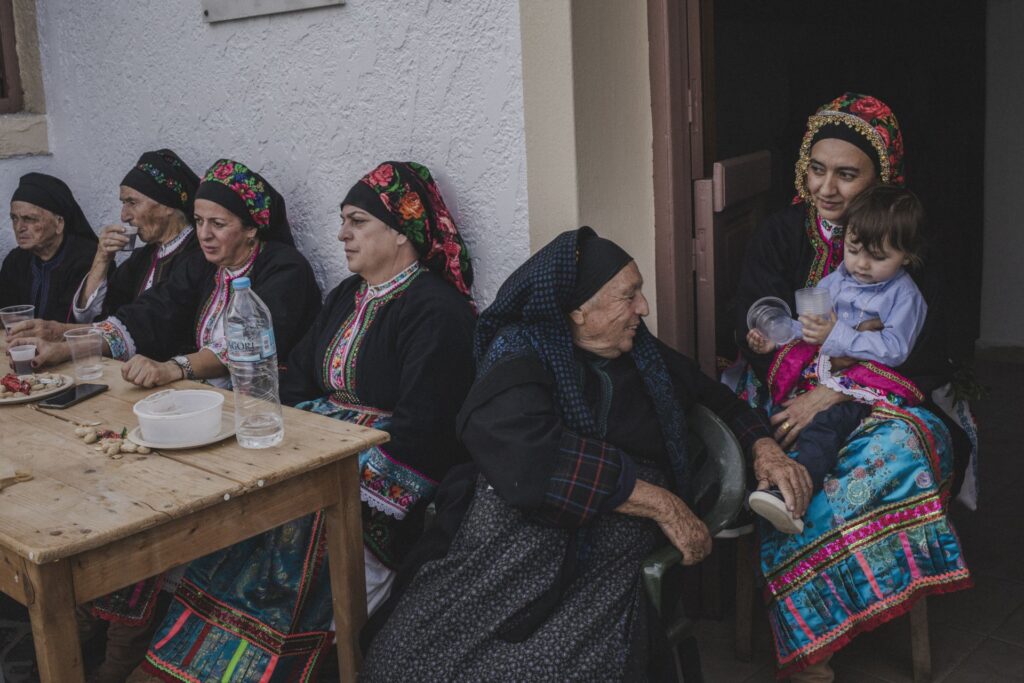
“Here, our children and grandchildren are like passing tourists,” Anna reflects. “They come to visit for a short while during the summer, but for the rest of the year, the village is hollow.”
Olympos stands as a testament to a vanishing way of life, its last inhabitants a living chronicle of the resilience of women in a matriarchy. With each departure of the younger generations, this unique matrilineal sanctuary finds itself teetering on the edge of oblivion.
Become a member today to receive access to all our paywalled essays and the best of New Lines delivered to your inbox through our newsletters.



